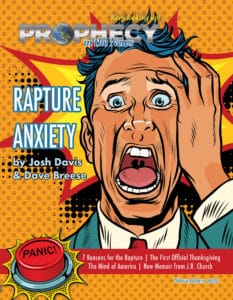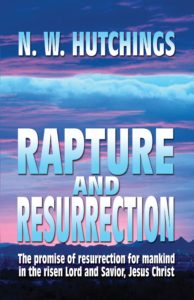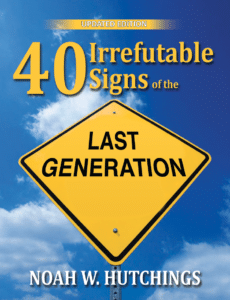Is the Word “Rapture” in the Bible?

I recently spoke at a church in Kansas. After the service, an upset woman walked up to me. She had a frown on her face. With an angry tone, she said, “I didn’t like what you said in the sermon.” I replied, “Which part did you not like?” “That part about the Rapture,” she snorted. “Oh, why didn’t you like that part?” I asked. “Because it is unbiblical,” she said, “Don’t you know the word ‘rapture’ is not even in the Bible.”
The upset woman was only half right. She was wrong about the Rapture being unbiblical, but she was right about the word “rapture” not being in the English translation of the Bible. However, just because a word is not in the Bible does not mean that those things are not real. The word “Bible” is not in the Bible either. Is your Bible not real?
It is true that if you were to search all the 783,137 words in the King James Bible, you would not find the word “rapture.” However, you would find the doctrine of the Rapture. The event is described in Paul’s first letter to the church in Thessalonica: “For the Lord himself shall descend from heaven with a shout, with the voice of the archangel, and with the trump of God: and the dead in Christ shall rise first: Then we which are alive and remain shall be caught up together with them in the clouds, to meet the Lord in the air: and so shall we ever be with the Lord. Wherefore comfort one another with these words” (1 Thessalonians 4:16–18).
The Christians in Thessalonica were troubled that those believers who had died might miss out on Christ’s Second Coming. So, the Apostle Paul wrote to assure them that they should not be concerned about the departed believers because they will experience the Rapture together with God’s people who are still alive when Christ returns. Paul reveals the “dead in Christ shall rise first” (1 Thess. 4:16) to receive their resurrection bodies a moment before living believers are transformed into their new glorified bodies.
Paul uses the expression “caught up” (1 Thess. 4:17) to describe the catching up of both the dead and living Christians. The Greek word for “caught up” is harpazo (which means to snatch, seize, or take away). Harpazo was translated in Latin versions of the Bible with the word rapturo, which is the English word rapture. So, while it is true that the word “rapture” is not in the Bible, the doctrine of the catching away of believers is definitely presented (1 Thess. 4:17; 1 Cor. 15:51–55).
The doctrine of the Rapture is found throughout the Bible, even in the Old Testament. The first recorded rapture was Enoch. The Bible says, “And Enoch walked with God: and he was not; for God took him” (Gen. 5:24). Enoch is an exception to all the other patriarchs who died. Instead of letting him die, “God took him.” Enoch was caught up and went directly to heaven without dying.
The prophet Elijah was also raptured. Second Kings 2 begins, “And it came to pass, when the Lord would take up Elijah into heaven by a whirlwind, that Elijah went with Elisha from Gilgal” (2 Kings 2:1). The Bible uses the expression “take up” to describe the Lord’s rapture of Elijah. The event is expounded upon a few verses later. The Bible says, “And it came to pass, as they still went on, and talked, that, behold, there appeared a chariot of fire, and horses of fire, and parted them both asunder; and Elijah went up by a whirlwind into heaven” (2 Kings 2:11). Thus, Elijah was caught up and went directly to heaven without dying.
In the New Testament, after finishing all that the Father had given Him to do, the Lord Jesus Christ was raptured: “And when he had spoken these things, while they beheld, he was taken up; and a cloud received him out of their sight. And while they looked stedfastly toward heaven as he went up, behold, two men stood by them in white apparel; Which also said, Ye men of Galilee, why stand ye gazing up into heaven? this same Jesus, which is taken up from you into heaven, shall so come in like manner as ye have seen him go into heaven” (Acts 1:9-11).
Jesus was raptured to heaven forty days after His resurrection. While the disciples stood and watched (probably with their mouths hanging open in amazement), two messengers from God appeared. God’s messengers said that Jesus would return one day in the same way. Jesus left by being “taken up” and was “received” by a cloud. Someday, Jesus will return to take up His bride into the clouds (1 Thess. 4:17) for their marriage in heaven (Rev. 19:11–16). Seven years later, Jesus will return to the Mount of Olives (Zech. 14:4) to set up His Millennial Kingdom.
Philip was raptured after his encounter with the Ethiopian eunuch. The experience is detailed in the Book of Acts (Acts 8:25–40). Philip was led by an angel to meet with the Ethiopian eunuch. After the eunuch was baptized, God snatched Philip away (Acts 8:39). The Bible does not say whether Philip went up into Heaven and came back. It just says that he was snatched away and later found himself at Azotus.
The Book of Revelation details the future rapture of the two witnesses. At the midpoint of the Tribulation, the Antichrist will kill the two witnesses. He will leave their dead bodies in the streets of Jerusalem for three-and-a-half days, in which time all the population of the world will celebrate. The celebrations will stop when the two witnesses suddenly come back to life. Then they will follow the Lord’s command to “come up hither,” and they will be raptured to heaven (Rev. 11:3–12).
Also, in the Book of Revelation, the Apostle John describes his own personal rapture. The Bible says, “After this I looked, and, behold, a door was opened in heaven: and the first voice which I heard was as it were of a trumpet talking with me; which said, Come up hither, and I will shew thee things which must be hereafter” (Rev. 4:1). Here, John is a type of church. He was told to “come up hither” just as the church will be called up to Heaven at the Rapture.
It is worth noting that the focus of the Book of Revelation changes after Revelation 4:1. Up to that point, Revelation was focused on the church, but there is no mention of the church again until the end of the book (Rev. 22:16). The prophecies of Revelation 4–19 concern them that dwell on the earth (Rev. 6:10). There is only mention of “saints,” who are those who hear the Gospel and accept Christ during the Tribulation. The church is not on the earth during this period which is in line with the doctrine of the Pre-Tribulation Rapture. John, who was one of the first true members of the church of Jesus Christ, is a fitting symbol of the church being taken out of the world before the Tribulation begins.
Like John, the Apostle Paul describes a personal rapture in his second letter to believers in Corinth. He refers to “a man” who was caught up into Heaven. He writes, “I knew a man in Christ above fourteen years ago, (whether in the body, I cannot tell; or whether out of the body, I cannot tell: God knoweth;) such an one caught up to the third heaven” (2 Cor. 12:2). Even though he does not directly identify himself as “the man” in this passage, it is clear from the context that he is speaking of himself. Paul says that he was not sure if he was “in the body” or “out of the body.” However, he did know that he was “caught up” into the third heaven either physically or spiritually. Second Corinthians was written after 1 Thessalonians. Paul had already used the word harpazo (caught up) to describe the Rapture of believers. He uses the same word to describe what happened to him here.
I would like to point out that Paul says this rapture happened to “a man in Christ.” According to 1 Thessalonians 4:14–16, only those “in Christ” will be caught up in the Rapture. Only those who have trusted Jesus as Lord and Savior will be taken up. The lost will stay behind. If you are not a Christian, you need to get ready or get left.
So, while the word “rapture” may not be in the Bible, the concept is clearly a biblical concept. However, if you don’t like using the word “rapture” just because it is not in the Bible, you can just say, “I am looking forward to 1 Thessalonians 4:16–17.” Or “I am excited about the day when we will be caught up.” Or “I can’t wait for the translation of the church.” Or “I am anticipating the snatching away of the saints.”
I think I will stick with Rapture if you don’t mind.
For more rapture insight, check out these resources:







Leave a Reply